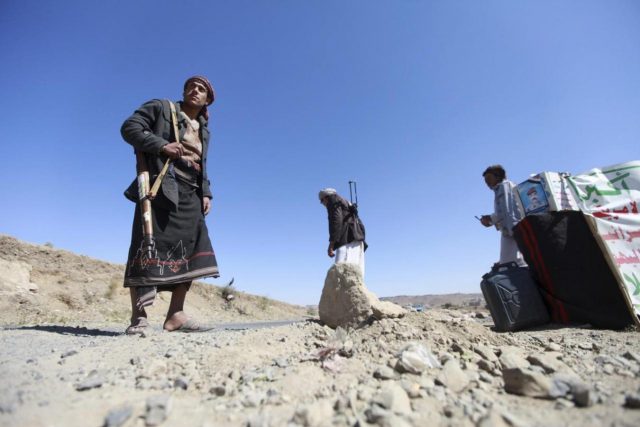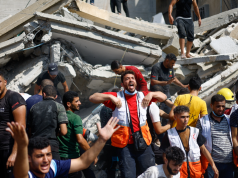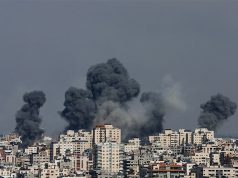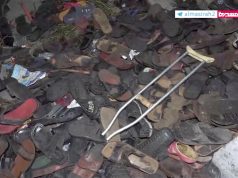LONDON — Iran’s Revolutionary Guards have started using a new route across the Gulf to funnel covert arms shipments to their Houthi allies in Yemen’s civil war, sources familiar with the matter have told Reuters.
In March, regional and Western sources told Reuters that Iran was shipping weapons and military advisers to the Houthis either directly to Yemen or via Somalia. This route however risked contact with international naval vessels on patrol in the Gulf of Oman and the Arabian Sea.
For the last six months the Islamic Revolutionary Guards Corps has begun using waters further up the Gulf between Kuwait and Iran as it looks for new ways to beat an embargo on arms shipments to fellow Shi’ites in the Houthi movement, Western and Iranian sources say.
Using this new route, Iranian ships transfer equipment to smaller vessels at the top of the Gulf, where they face less scrutiny. The transhipments take place in Kuwaiti waters and in nearby international shipping lanes, the sources said.
“Parts of missiles, launchers and drugs are smuggled into Yemen via Kuwaiti waters,” said a senior Iranian official. “The route sometimes is used for transferring cash as well.”
The official added that “what is especially smuggled recently, or to be precise in the past six months, are parts of missiles that cannot be produced in Yemen.”
Cash and drugs can be used to fund Houthi activities, the official said.
Yemen is more than two years into a civil war pitting the Houthis against the government of President Abd-Rabbu Mansour Hadi, which is backed by a Saudi-led coalition. More than 10,000 people have died in fighting and a cholera epidemic has infected more than 300,000 in a country on the brink of famine.
In backing the Houthis against a coalition led by its Sunni enemy Saudi Arabia, Iran is stepping up support for a Shi’ite ally in a war whose outcome could sway the balance of power in the Middle East.
Military equipment
Efforts to intercept military equipment by the coalition have had limited success, with no reported maritime seizures of weapons or ammunition during 2017 so far and only a few seizures on the main land route from the east of Yemen.
Independent U.N. investigators, who monitor Yemen sanctions, told the Security Council in their latest confidential report, which Reuters has seen, that they continue to investigate potential arms trafficking routes.
They said the United Arab Emirates — which is part of the coalition – had reported 11 attacks since September 2016 against its ground forces by Houthis using drones, or UAVs, armed with explosives.
“Although Houthi-aligned media announced that the Sanaa-based Ministry of Defense could manufacture the UAV, in reality they are assembled from components supplied by an outside source and shipped into Yemen,” the report said.
The report added that the Houthis “will eventually deplete their limited stock of missiles.” This would force the Houthis to end a campaign of missile attacks against Saudi territory unless they are resupplied from external sources.
An earlier UN report in January said the Houthis needed to replenish stocks of anti-tank guided weapons.
The arms smuggling operation may not turn the tide of the conflict, but it will allow the Houthis receive stable supplies of equipment that is otherwise hard to obtain.
Safe route
“The volume of the activity, I don’t call it a trade, is not very large. But it is a safe route,” a second senior Iranian official said.
“Smaller Iranian ports are being used for the activity as major ports might attract attention.”
Asked if the IRGC was involved, the second official said: “No activity goes ahead in the Gulf without the IRGC being involved. This activity involves a huge amount of money as well as transferring equipment to Iranian-backed groups in their fight against their enemies.”
A third senior Iranian official also confirmed the shipment activity and pointed to IRGC involvement.
The IRGC is Iran’s most powerful internal and external security force, with a sophisticated intelligence and surveillance network together with elite units which are playing a key role in the war in Syria in support of the government.
The IRGC declined to comment on the arms shipments and Iranian foreign ministry officials could not immediately be reached.
Houthi officials were also not immediately available for comment but in March a Houthi leader, who declined to be identified, said accusations that Iran was smuggling weapons into Yemen were an attempt to cover up Saudi Arabia’s failure to prevail in the war there.
Kuwaiti officials did not respond to questions. A U.S. Navy spokesman said he had no information on the matter.
“(The territorial waters of) Iran, Kuwait and Iraq in the northern Persian Gulf butt up against each other,” said Gerry Northwood, of maritime security firm MAST and a former British Royal Navy captain who has commanded warships in the region.
“There is still plenty of room for smugglers to operate. In fact the whole Persian Gulf is a hive of small boat activity. And this is in an area where one man’s illegitimate trade is another’s legitimate trade.”
Hundreds of ships sail through the Bab el-Mandeb and Strait of Hormuz every day — waterways which pass along the coasts of Yemen and Iran. Many are small dhows, which are hard to track.
Western shipping and security sources said that since March there had been an increase in suspicious activity involving Iranian-flagged ships in waters near Kuwait.
“Waters around Kuwait are being used by Iranians to funnel … equipment to Yemen,” said an international arms dealer based in the Mediterranean area with knowledge of the matter.
“Consignments are either transferred to other craft, such as small boats, or they are dropped near buoys to be picked up by passing ships.”
The arms dealer, who declined to be identified, said there were many coves and deserted bays in neighboring Iraq that also provided opportunities for this type of covert activity.
The Western sources said consignments were transported from smaller Iranian ports across the sea lanes near Kuwait, which is 100 nautical miles from Iran.
To avoid detection, the mainly Iranian-flagged vessels switch off their identification transponders, sometimes for days. They rendezvous with other ships or drop supplies close to buoys, so the consignments can be recovered for onward transport, the sources said.









